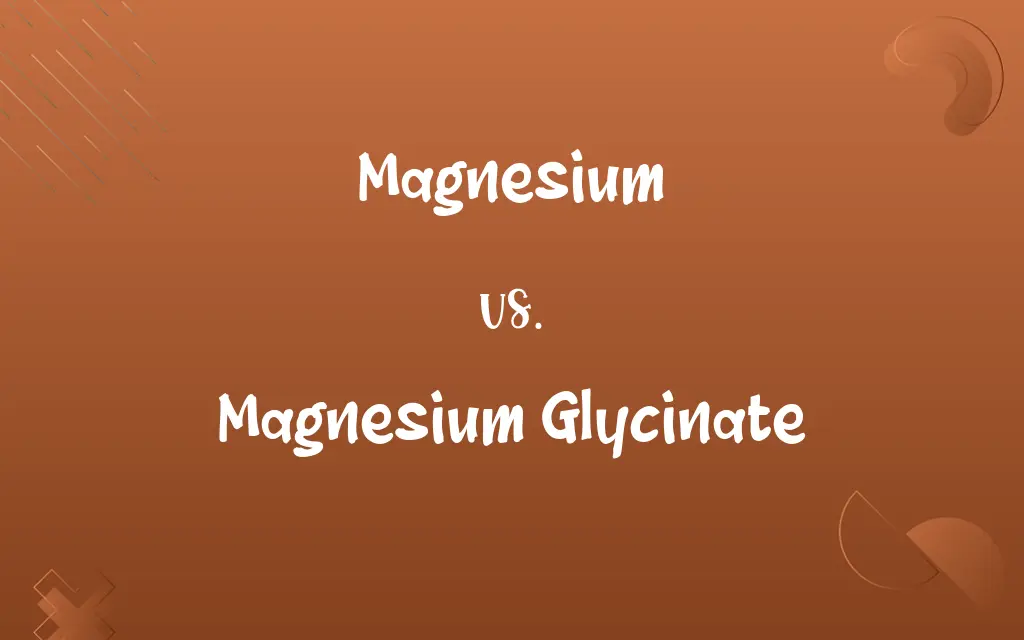Magnesium vs. Magnesium Glycinate: Know the Difference

By Shumaila Saeed || Published on January 9, 2024
Magnesium is a chemical element essential for bodily functions, while magnesium glycinate is a magnesium salt combined with glycine for better absorption and reduced laxative effect.

Key Differences
Magnesium is a silver-white, lightweight metal, one of the elements on the periodic table (symbol Mg), crucial for numerous biological processes. Magnesium glycinate, on the other hand, is a compound formed by combining magnesium with the amino acid glycine, designed for dietary supplements.
Shumaila Saeed
Jan 09, 2024
Magnesium in its elemental form is vital for muscle and nerve function, bone health, and energy production. Magnesium glycinate specifically aids in enhancing magnesium's absorption and is believed to have a calming effect on the brain due to glycine.
Shumaila Saeed
Jan 09, 2024
Pure magnesium is used in various industries, including in alloys and as a reducing agent in organic chemistry. Magnesium glycinate is primarily used in nutritional supplements, targeting individuals needing magnesium supplementation without gastrointestinal side effects.
Shumaila Saeed
Jan 09, 2024
While magnesium in excess can cause diarrhea and other digestive issues, magnesium glycinate is often preferred for its higher bioavailability and lower risk of causing laxative effects, making it suitable for long-term supplementation.
Shumaila Saeed
Jan 09, 2024
Magnesium, in its elemental form, reacts with water, releasing hydrogen gas. In contrast, magnesium glycinate is highly soluble in water and does not react violently, making it a stable form for oral consumption.
Shumaila Saeed
Jan 09, 2024
ADVERTISEMENT
Comparison Chart
Word Origin
Greek (magnesia)
Combination of Magnesium and Glycine (from Greek and Latin)
Shumaila Saeed
Jan 09, 2024
Usage in Conversation
Common in science and health
More specific to health and nutrition
Shumaila Saeed
Jan 09, 2024
ADVERTISEMENT
Magnesium and Magnesium Glycinate Definitions
Magnesium
Magnesium is used in alloys to make materials like aluminum-magnesium alloys.
Magnesium is valued in the automotive industry for its light weight.
Shumaila Saeed
Dec 28, 2023
Magnesium Glycinate
Magnesium glycinate helps in regulating sleep patterns.
Taking magnesium glycinate before bed can improve sleep quality.
Shumaila Saeed
Dec 28, 2023
Magnesium
Magnesium is found in foods like nuts, seeds, and green leafy vegetables.
Spinach is a good source of dietary magnesium.
Shumaila Saeed
Dec 28, 2023
Magnesium Glycinate
Magnesium glycinate is effective in managing anxiety and stress.
Doctors sometimes suggest magnesium glycinate for its stress-reducing properties.
Shumaila Saeed
Dec 28, 2023
Magnesium
Magnesium is a chemical element with the symbol Mg and atomic number 12.
Magnesium is a critical component in photosynthesis in plants.
Shumaila Saeed
Dec 28, 2023
ADVERTISEMENT
Magnesium Glycinate
Magnesium glycinate supports muscle and nerve function and maintains bone health.
Athletes use magnesium glycinate for muscle recovery.
Shumaila Saeed
Dec 28, 2023
Magnesium
Magnesium reacts with acids, releasing hydrogen gas.
When magnesium reacts with hydrochloric acid, it produces hydrogen.
Shumaila Saeed
Dec 28, 2023
Magnesium Glycinate
Magnesium glycinate is a magnesium salt of glycine, used as a dietary supplement.
Magnesium glycinate is often recommended for its calming effects on the brain.
Shumaila Saeed
Dec 28, 2023
Magnesium
Magnesium is a mineral essential for human health.
Doctors often recommend magnesium supplements for muscle cramps.
Shumaila Saeed
Dec 28, 2023
Magnesium Glycinate
Magnesium glycinate is known for its high bioavailability and gentle effect on the stomach.
People with sensitive stomachs may prefer magnesium glycinate over other forms.
Shumaila Saeed
Dec 28, 2023
Magnesium
A light, silvery-white, moderately hard metallic element that in ribbon or powder form burns with a brilliant white flame. Obtained chiefly from magnesite, dolomite, and bodies of salt water, it is used in structural alloys, pyrotechnics, flash photography, and incendiary bombs. Atomic number 12; atomic weight 24.305; melting point 650°C; boiling point 1,090°C; specific gravity 1.738 (at 20°C); valence 2. See Periodic Table.
Shumaila Saeed
Dec 27, 2023
Magnesium
The chemical element (symbol Mg) with an atomic number of 12. It is a light, easily flammable, silvery-white alkaline earth metal.
Shumaila Saeed
Dec 27, 2023
Magnesium
A light silver-white metallic element of atomic number 12, malleable and ductile, quite permanent in dry air but tarnishing in moist air. It burns, forming (the oxide) magnesia, with the production of a blinding light (the so-called magnesium light) which is used in signaling, in pyrotechny, or in photography where a strong actinic illuminant is required. Its compounds occur abundantly, as in dolomite, talc, meerschaum, etc. Symbol Mg. Atomic weight, 24.305. Specific gravity, 1.75.
Shumaila Saeed
Dec 27, 2023
Magnesium
A light silver-white ductile bivalent metallic element; in pure form it burns with brilliant white flame; occurs naturally only in combination (as in magnesite and dolomite and carnallite and spinel and olivine)
Shumaila Saeed
Dec 27, 2023
Repeatedly Asked Queries
Why is magnesium important for the body?
It is crucial for muscle and nerve function, bone health, and energy production.
Shumaila Saeed
Jan 09, 2024
What is magnesium glycinate?
A compound of magnesium and the amino acid glycine, used as a supplement.
Shumaila Saeed
Jan 09, 2024
How much magnesium should one take daily?
It varies, but typically 310-420 mg for adults.
Shumaila Saeed
Jan 09, 2024
Does magnesium help with sleep?
Yes, it can aid in improving sleep quality.
Shumaila Saeed
Jan 09, 2024
What is magnesium?
A chemical element essential for numerous bodily functions.
Shumaila Saeed
Jan 09, 2024
Why choose magnesium glycinate over other forms?
It's better absorbed and gentler on the stomach.
Shumaila Saeed
Jan 09, 2024
What are the side effects of too much magnesium?
Diarrhea, nausea, and abdominal cramping.
Shumaila Saeed
Jan 09, 2024
Can magnesium be found in food?
Yes, in nuts, seeds, green vegetables, and whole grains.
Shumaila Saeed
Jan 09, 2024
Is magnesium glycinate natural?
It's a synthesized form, combining natural elements.
Shumaila Saeed
Jan 09, 2024
Are there any side effects of magnesium glycinate?
Few, but may include headache or drowsiness.
Shumaila Saeed
Jan 09, 2024
How does magnesium glycinate affect the brain?
It has a calming and stress-reducing effect.
Shumaila Saeed
Jan 09, 2024
How is magnesium glycinate absorbed in the body?
It's absorbed in the intestines and distributed throughout the body.
Shumaila Saeed
Jan 09, 2024
Can magnesium help with muscle cramps?
Yes, it's effective for muscle relaxation.
Shumaila Saeed
Jan 09, 2024
Is magnesium essential for heart health?
Yes, it helps regulate heart rhythm and blood pressure.
Shumaila Saeed
Jan 09, 2024
Does magnesium interact with medications?
Yes, it can interact with certain antibiotics and other drugs.
Shumaila Saeed
Jan 09, 2024
Can children take magnesium glycinate?
Yes, but in lower doses and under medical supervision.
Shumaila Saeed
Jan 09, 2024
Does cooking affect magnesium content in food?
Yes, high heat and prolonged cooking can reduce it.
Shumaila Saeed
Jan 09, 2024
Can magnesium glycinate aid in bone health?
Yes, by helping in the maintenance of bone density.
Shumaila Saeed
Jan 09, 2024
Is magnesium glycinate safe for long-term use?
Generally, yes, under medical guidance.
Shumaila Saeed
Jan 09, 2024
Share this page
Link for your blog / website
HTML
Link to share via messenger
About Author
Written by
Shumaila SaeedShumaila Saeed, an expert content creator with 6 years of experience, specializes in distilling complex topics into easily digestible comparisons, shining a light on the nuances that both inform and educate readers with clarity and accuracy.









































































